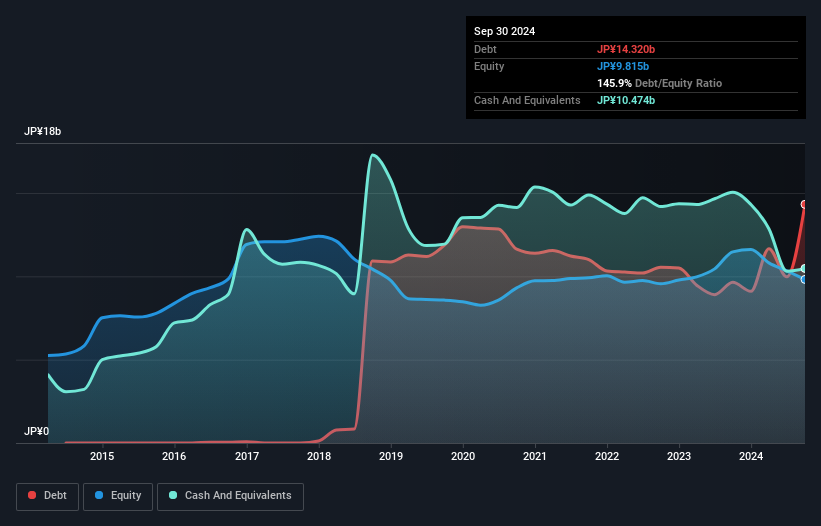
The external fund manager backed by Berkshire Hathaway's Charlie Munger, Li Lu, makes no bones about it when he says 'The biggest investment risk is not the volatility of prices, but whether you will suffer a permanent loss of capital.' It's only natural to consider a company's balance sheet when you examine how risky it is, since debt is often involved when a business collapses. Importantly, CROOZ, Inc. (TSE:2138) does carry debt. But the real question is whether this debt is making the company risky.
What Risk Does Debt Bring?
Generally speaking, debt only becomes a real problem when a company can't easily pay it off, either by raising capital or with its own cash flow. In the worst case scenario, a company can go bankrupt if it cannot pay its creditors. However, a more common (but still painful) scenario is that it has to raise new equity capital at a low price, thus permanently diluting shareholders. By replacing dilution, though, debt can be an extremely good tool for businesses that need capital to invest in growth at high rates of return. The first thing to do when considering how much debt a business uses is to look at its cash and debt together.
See our latest analysis for CROOZ
What Is CROOZ's Debt?
As you can see below, at the end of September 2024, CROOZ had JP¥14.3b of debt, up from JP¥9.64b a year ago. Click the image for more detail. However, because it has a cash reserve of JP¥10.5b, its net debt is less, at about JP¥3.85b.

A Look At CROOZ's Liabilities
According to the last reported balance sheet, CROOZ had liabilities of JP¥5.82b due within 12 months, and liabilities of JP¥14.4b due beyond 12 months. Offsetting this, it had JP¥10.5b in cash and JP¥2.40b in receivables that were due within 12 months. So its liabilities total JP¥7.38b more than the combination of its cash and short-term receivables.
Given this deficit is actually higher than the company's market capitalization of JP¥5.88b, we think shareholders really should watch CROOZ's debt levels, like a parent watching their child ride a bike for the first time. In the scenario where the company had to clean up its balance sheet quickly, it seems likely shareholders would suffer extensive dilution. There's no doubt that we learn most about debt from the balance sheet. But you can't view debt in total isolation; since CROOZ will need earnings to service that debt. So if you're keen to discover more about its earnings, it might be worth checking out this graph of its long term earnings trend.
In the last year CROOZ wasn't profitable at an EBIT level, but managed to grow its revenue by 3.6%, to JP¥14b. That rate of growth is a bit slow for our taste, but it takes all types to make a world.
Caveat Emptor
Importantly, CROOZ had an earnings before interest and tax (EBIT) loss over the last year. Indeed, it lost a very considerable JP¥1.2b at the EBIT level. When we look at that alongside the significant liabilities, we're not particularly confident about the company. It would need to improve its operations quickly for us to be interested in it. Not least because it had negative free cash flow of JP¥2.3b over the last twelve months. That means it's on the risky side of things. There's no doubt that we learn most about debt from the balance sheet. However, not all investment risk resides within the balance sheet - far from it. For instance, we've identified 1 warning sign for CROOZ that you should be aware of.
At the end of the day, it's often better to focus on companies that are free from net debt. You can access our special list of such companies (all with a track record of profit growth). It's free.
New: AI Stock Screener & Alerts
Our new AI Stock Screener scans the market every day to uncover opportunities.
• Dividend Powerhouses (3%+ Yield)
• Undervalued Small Caps with Insider Buying
• High growth Tech and AI Companies
Or build your own from over 50 metrics.
Have feedback on this article? Concerned about the content? Get in touch with us directly. Alternatively, email editorial-team (at) simplywallst.com.
This article by Simply Wall St is general in nature. We provide commentary based on historical data and analyst forecasts only using an unbiased methodology and our articles are not intended to be financial advice. It does not constitute a recommendation to buy or sell any stock, and does not take account of your objectives, or your financial situation. We aim to bring you long-term focused analysis driven by fundamental data. Note that our analysis may not factor in the latest price-sensitive company announcements or qualitative material. Simply Wall St has no position in any stocks mentioned.
About TSE:2138
CROOZ
Engages in the e-commerce, media and advertising, and gaming businesses.
Imperfect balance sheet very low.
Market Insights
Community Narratives


